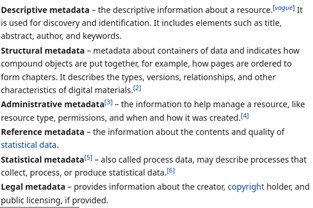Correct metadata translation is essential, it can help to enhance search engine results since local search engines default to users' native tongues; therefore, if you want to show up on page one, you must have high-quality translations of both the text and metadata.
What is metadata?
Metadata is used by every website and web page you've ever visited. The way we categorize and search for material online depends heavily on metadata. In essence, metadata is “data that gives information about other data,” and it includes a web page's title and description. In other words, Metadata can be viewed as pointers to data. Think back to your most recent Google search. Your mental list of metadata on the item you were looking for served as the basis for the search. It's possible that you started with a term, phrase, meme, location name, slang, or something else.

Metadata is as Valuable as the Data
In the context of archaeology, if an object's provenance or metadata are lost, it loses its scientific value.
Every artifact is bagged and labeled with a number that matches to notes in a log and is written on the bag. The same thing happens on the internet, images can have metadata that describes it, which help search engine organize images and people to find it quickly.
Think about the length and use of the Metadata
No words were misused, when translating your website, do not forget to translate everything, which include your metadata, which is used to find your content.
It took countless hours to perfect the content of your homepage or website, making sure that every sentence was the perfect length and that no words were misused. So it is important that the translated metadata is the right length (Meta descriptions are usually between 120 and 155 characters long), especially because when English text is translated into French, it tends to come out around 20-25% longer. The page or site's SEO (search engine optimization) will suffer if your meta description is too long or too short, so make sure the translation is the right length.
Create accurate yet appealing metadata. Use relevant keywords whenever possible to pull readers in and pique their interest while educating them about your page or website. The correct keyword density will ensure that your site or page is indexed by a variety of search engines because SEO relies on keywords. And while keywords are less significant for search engine than before, don’t forget that the metadata is used to help users quickly find your content.
Note: Don’t forget that most metadata have specific formatting, such as the schema.org format.
It is worthwhile to take the effort to become familiar with the market that your translated metadata will be aimed towards. Discover the keywords that are related to your goods or services in the target foreign market. Those keywords may not always be the most obvious ones and need to be research by someone that understand the target language as well as the intentions of the translated content.
Before translation:
Make sure you are satisfied with the text, length, and style before sending your metadata to a language service provider for translation. The entire process will take longer, and you'll likely pay more, if you request updates and modifications after translation work has already started. Edit twice, translate once, this will greatly simplify your life and guarantee that your meta descriptions are translated accurately into various languages.
Deciding which languages to translate into:
Now that, we know the importance of translating and localizing your content to reach a global audience. The next logical question is in what language should internationalize into? Hopefully, it shouldn't be complex to choose which languages to include on your e-commerce website. Where does the business now operate? Where will stores sell tomorrow? The secret is to conduct an analysis of both your current clientele and the markets you want to enter. You can learn more here, “What Matters Most in Selecting Languages? How to go international by translating and localizing.”

